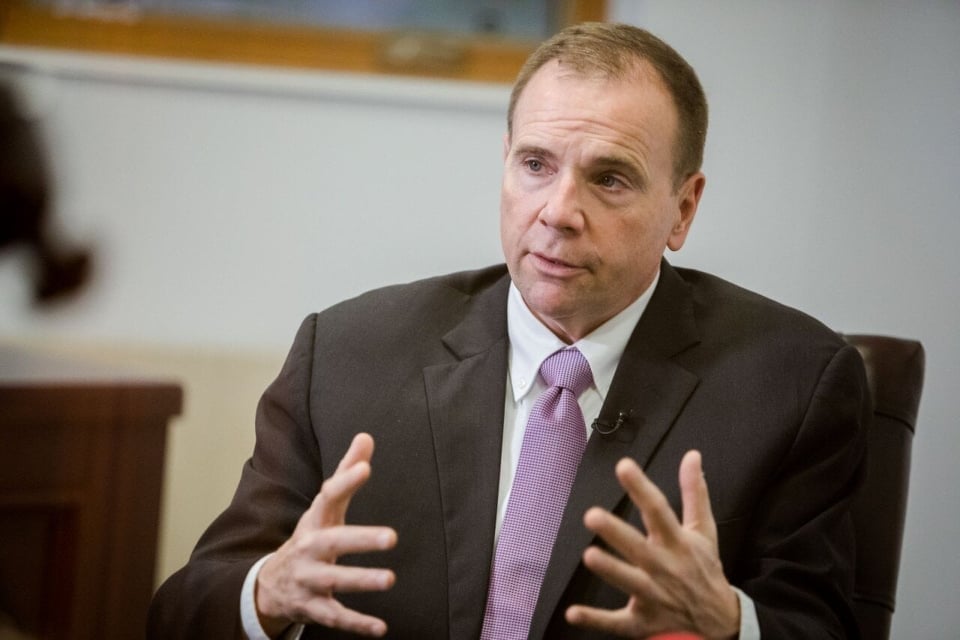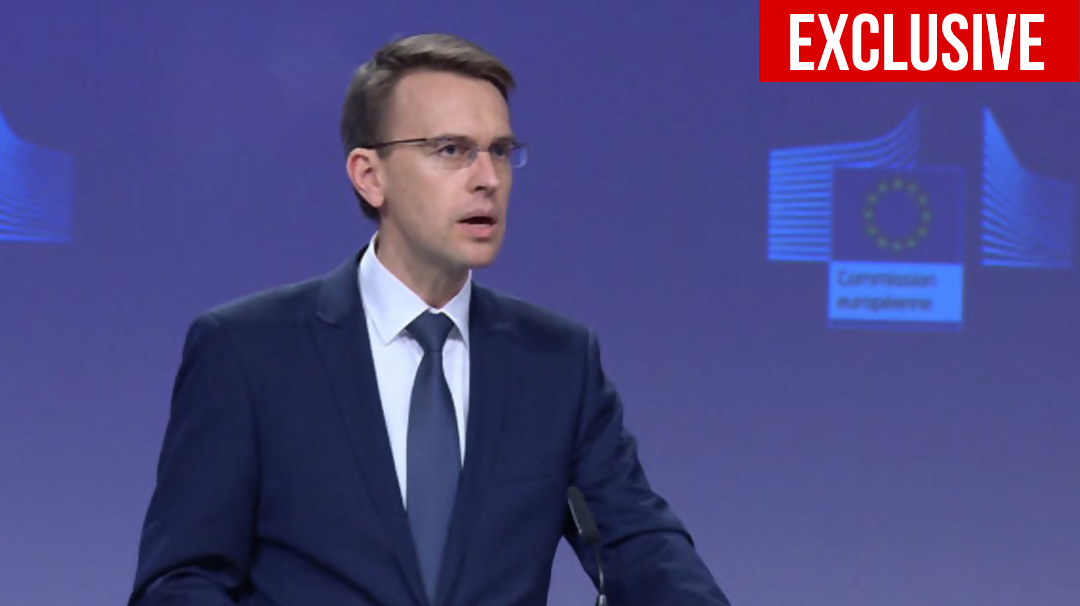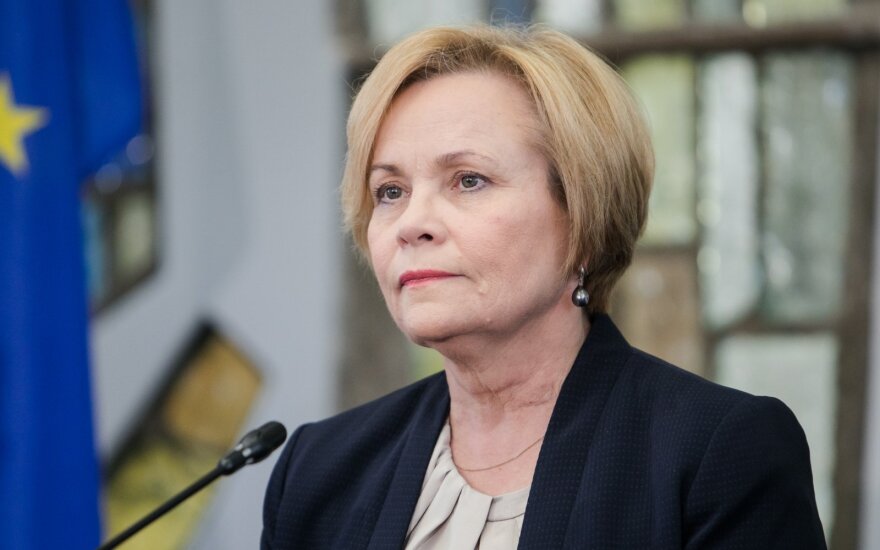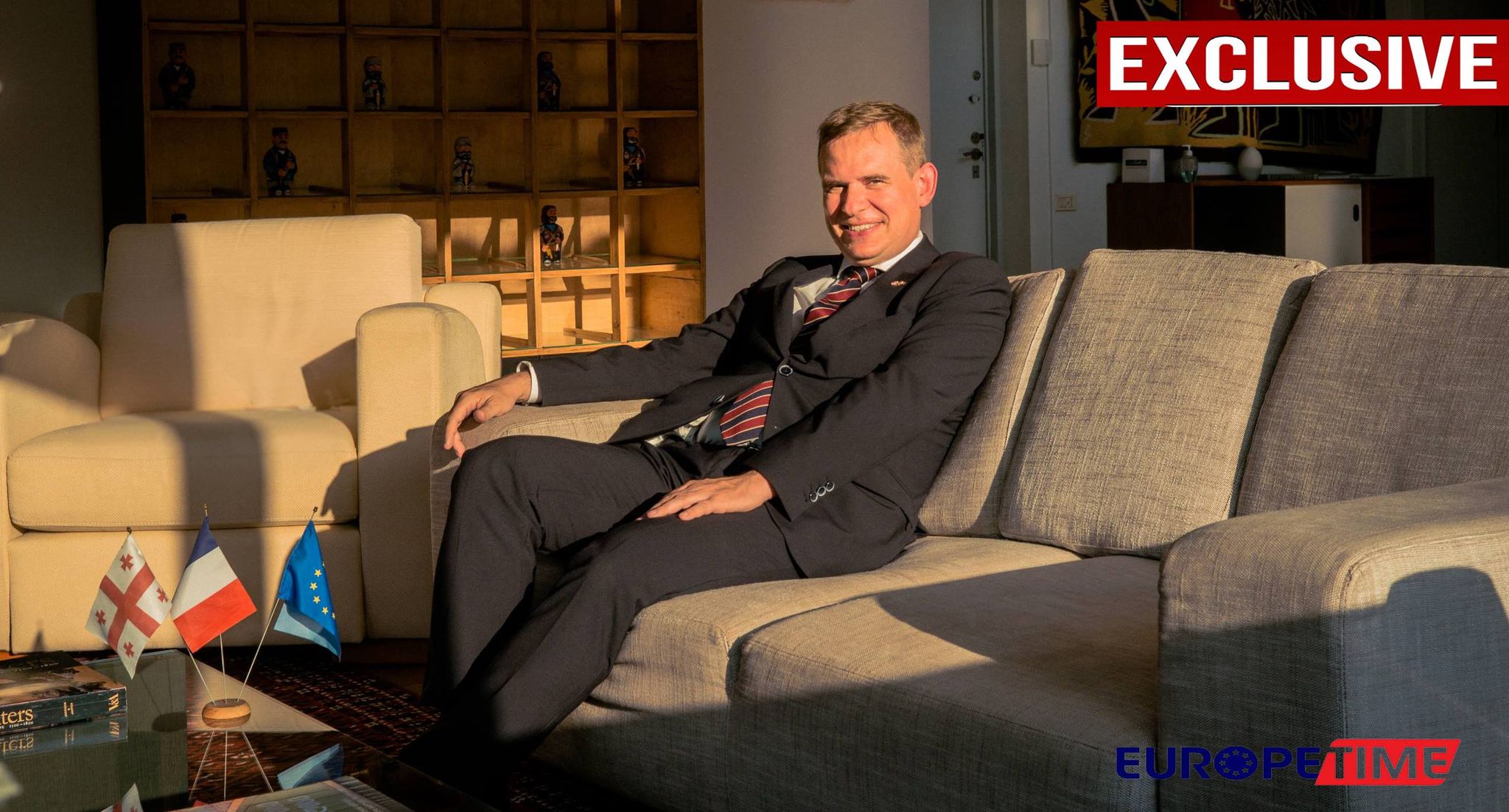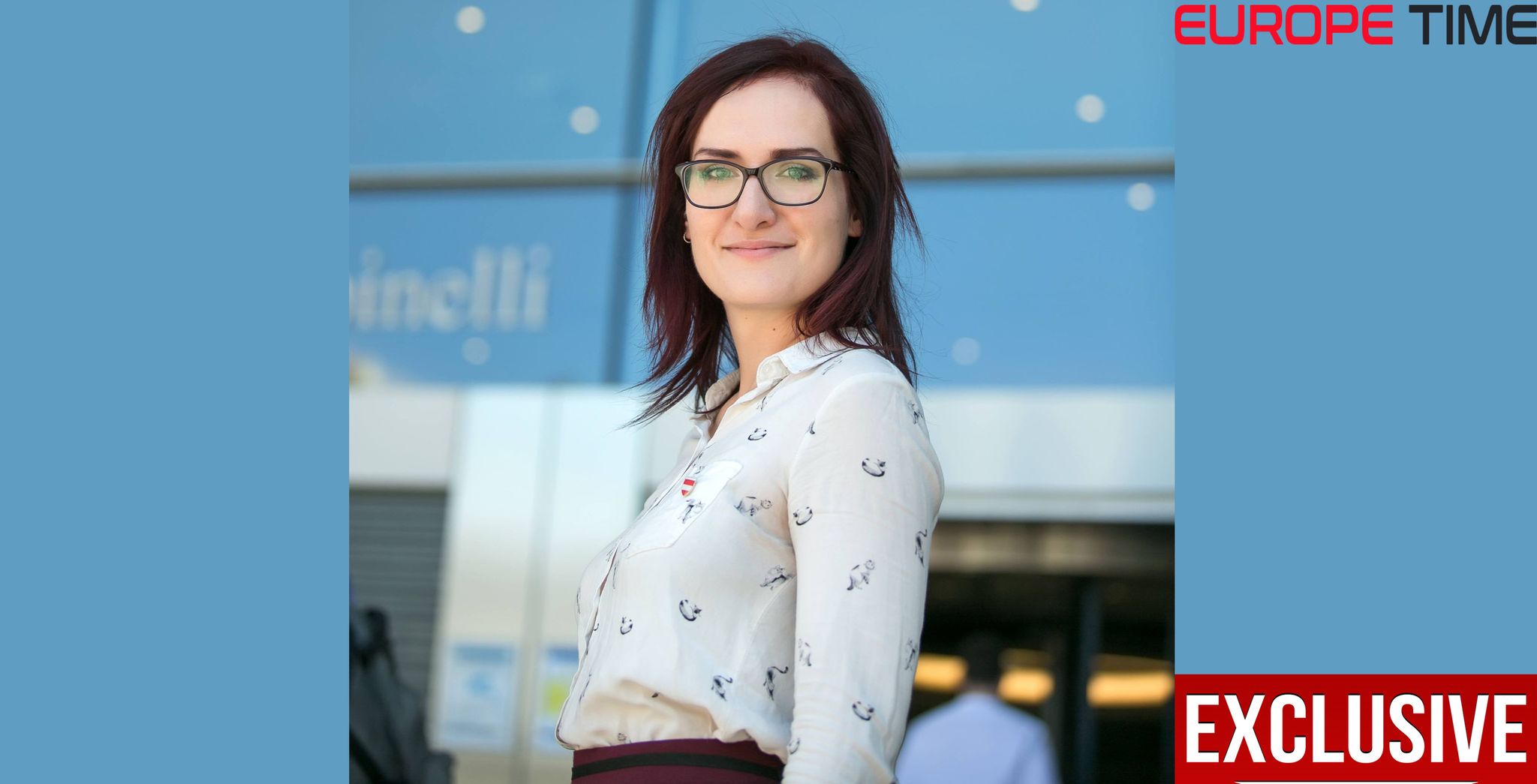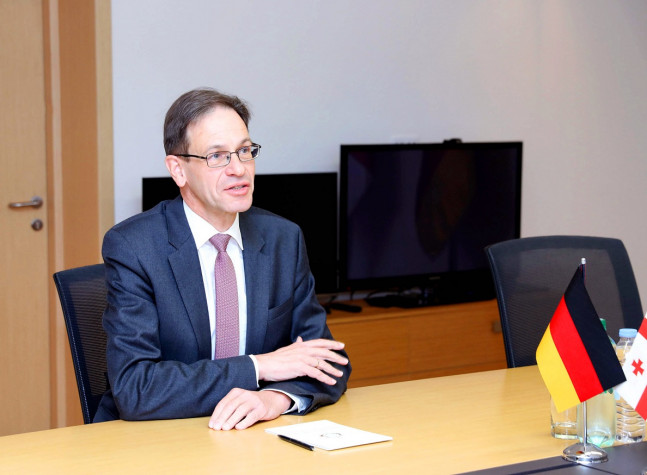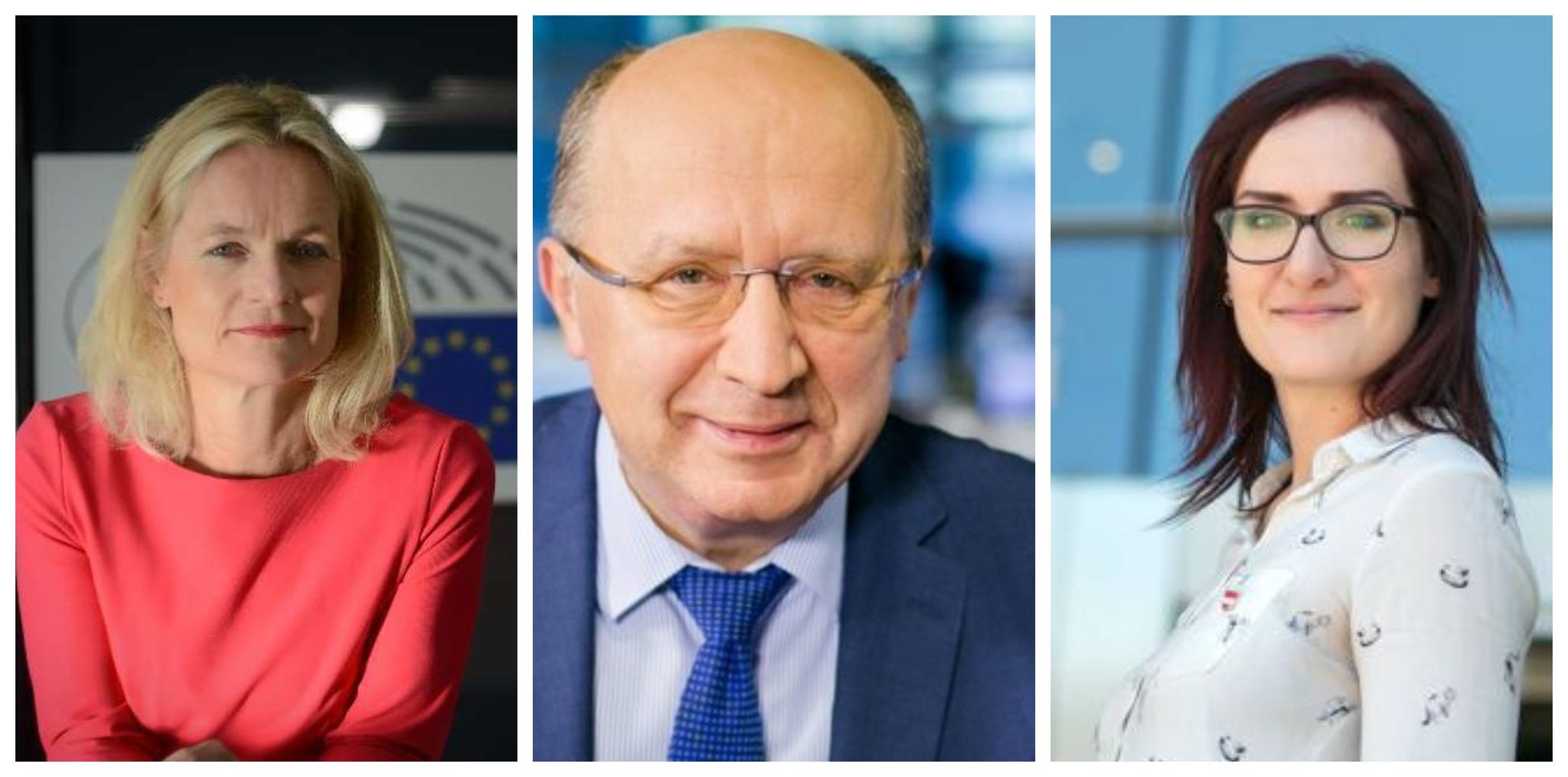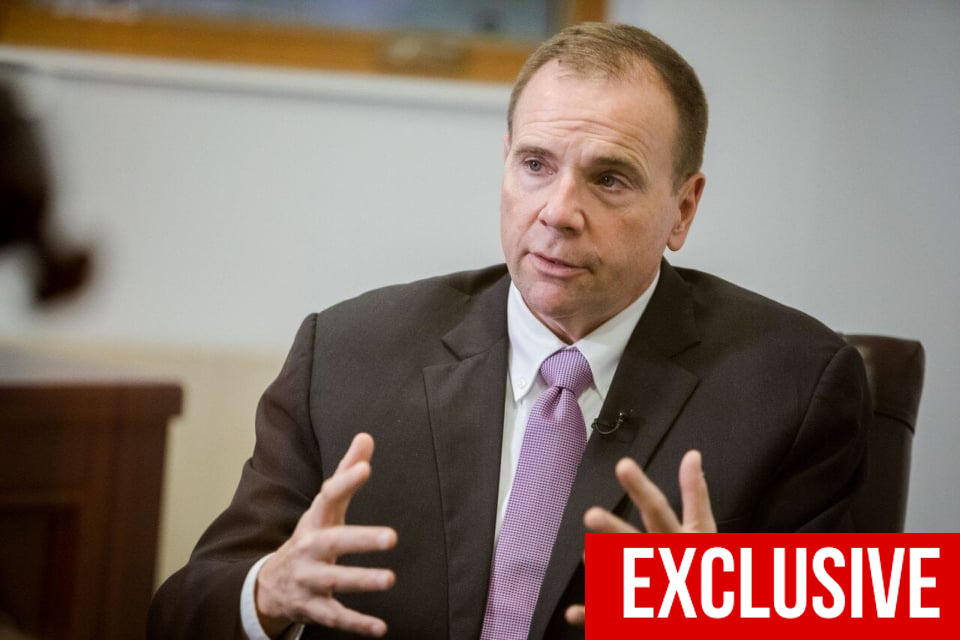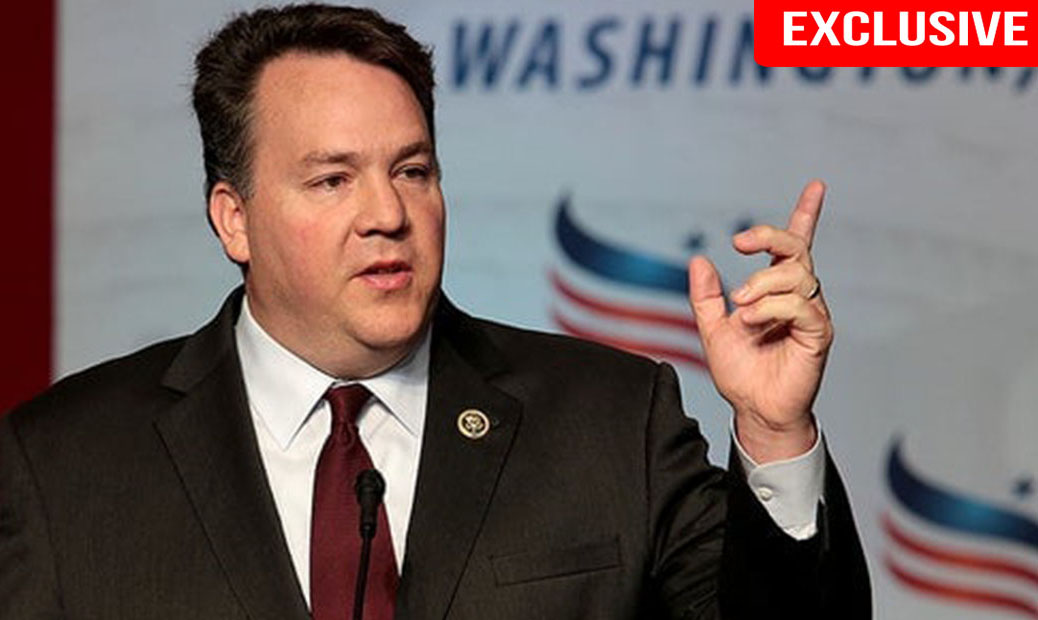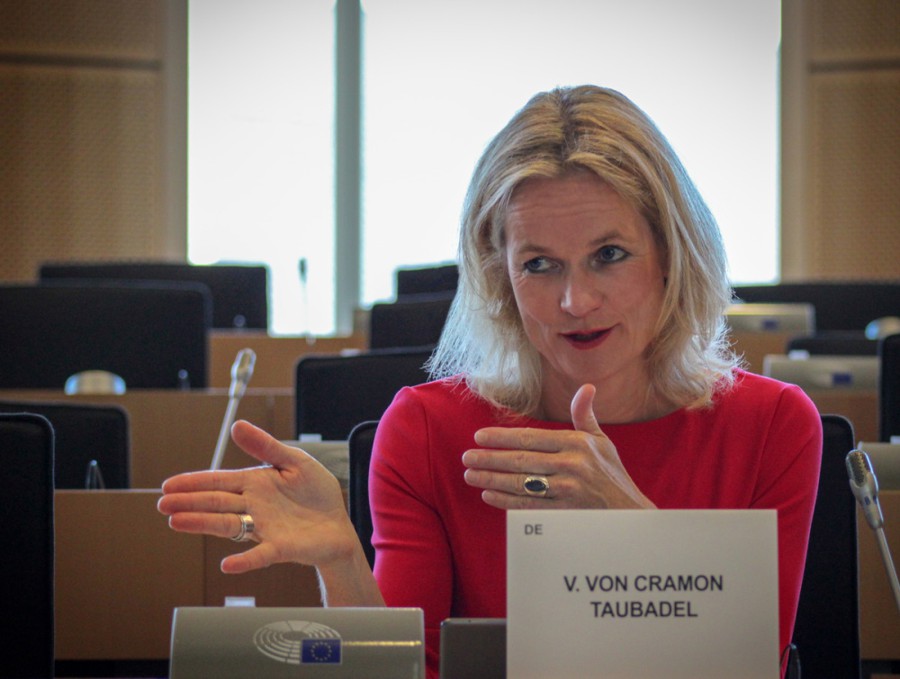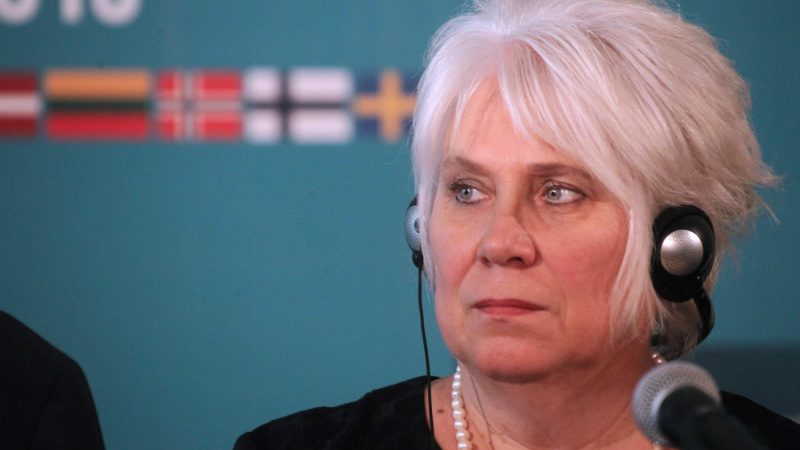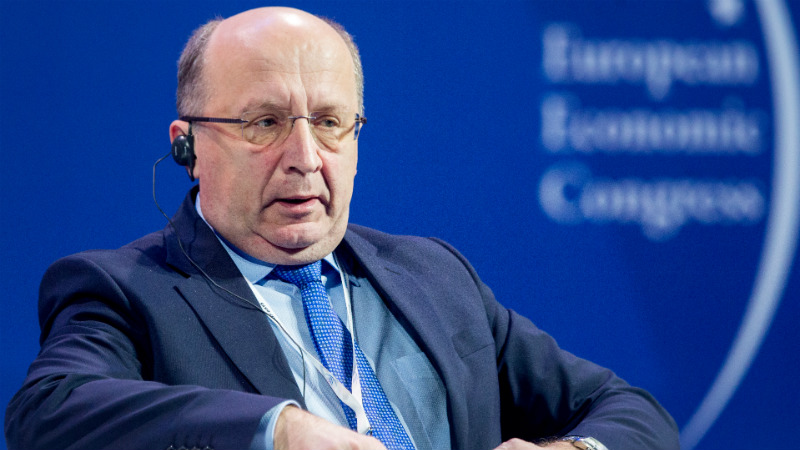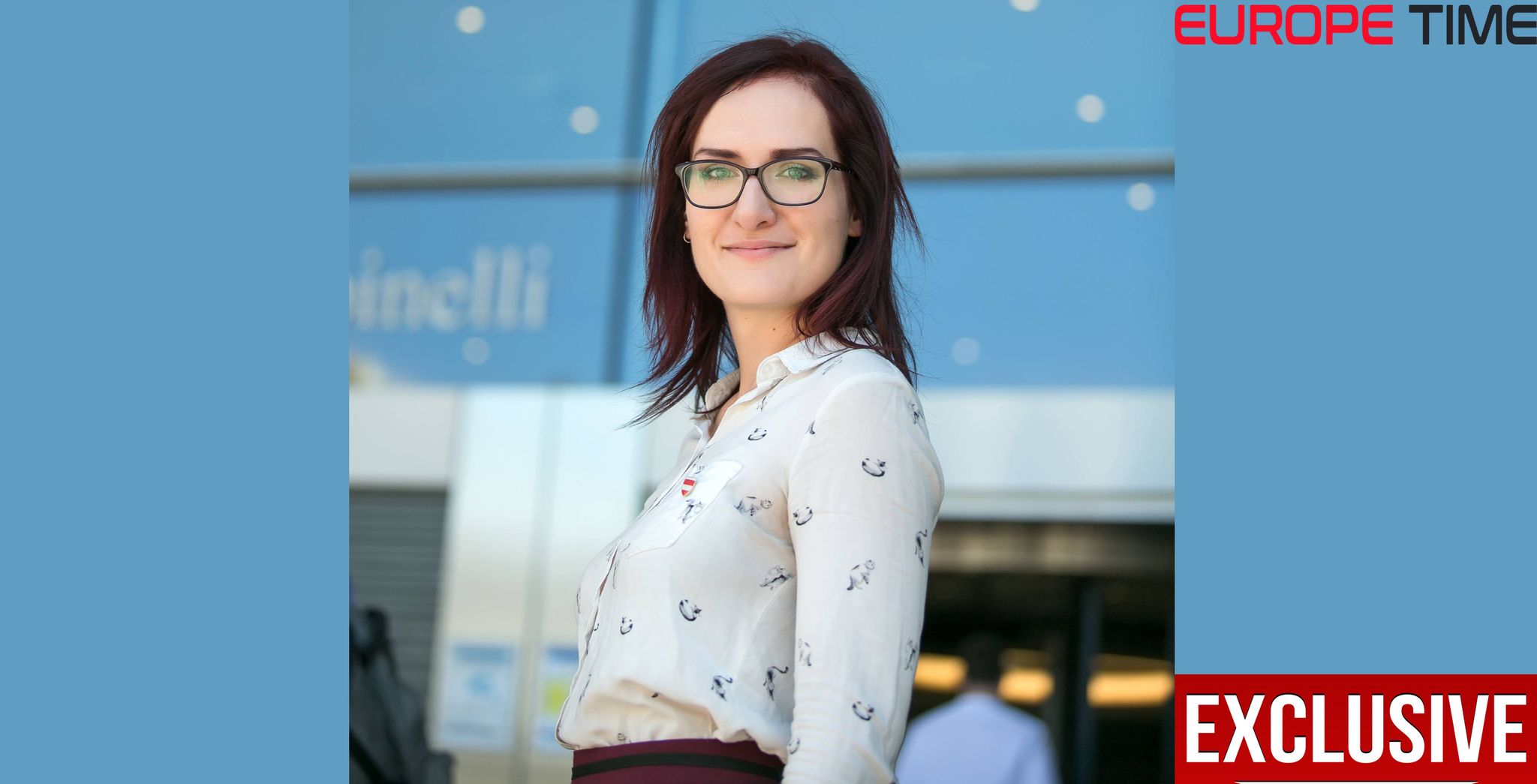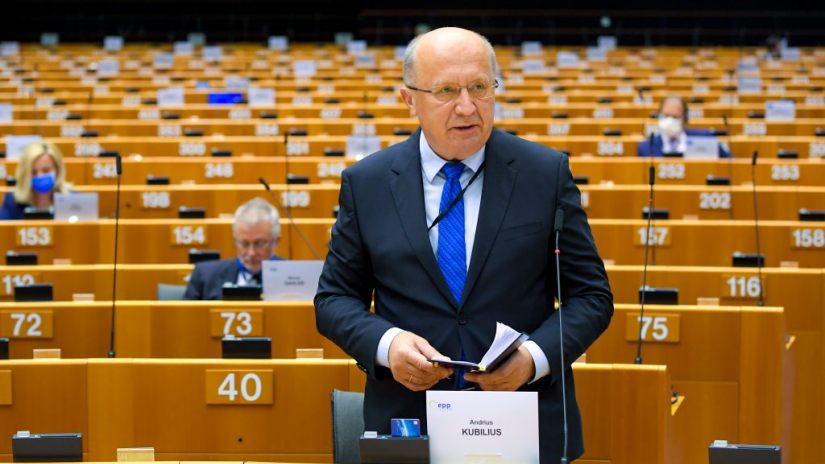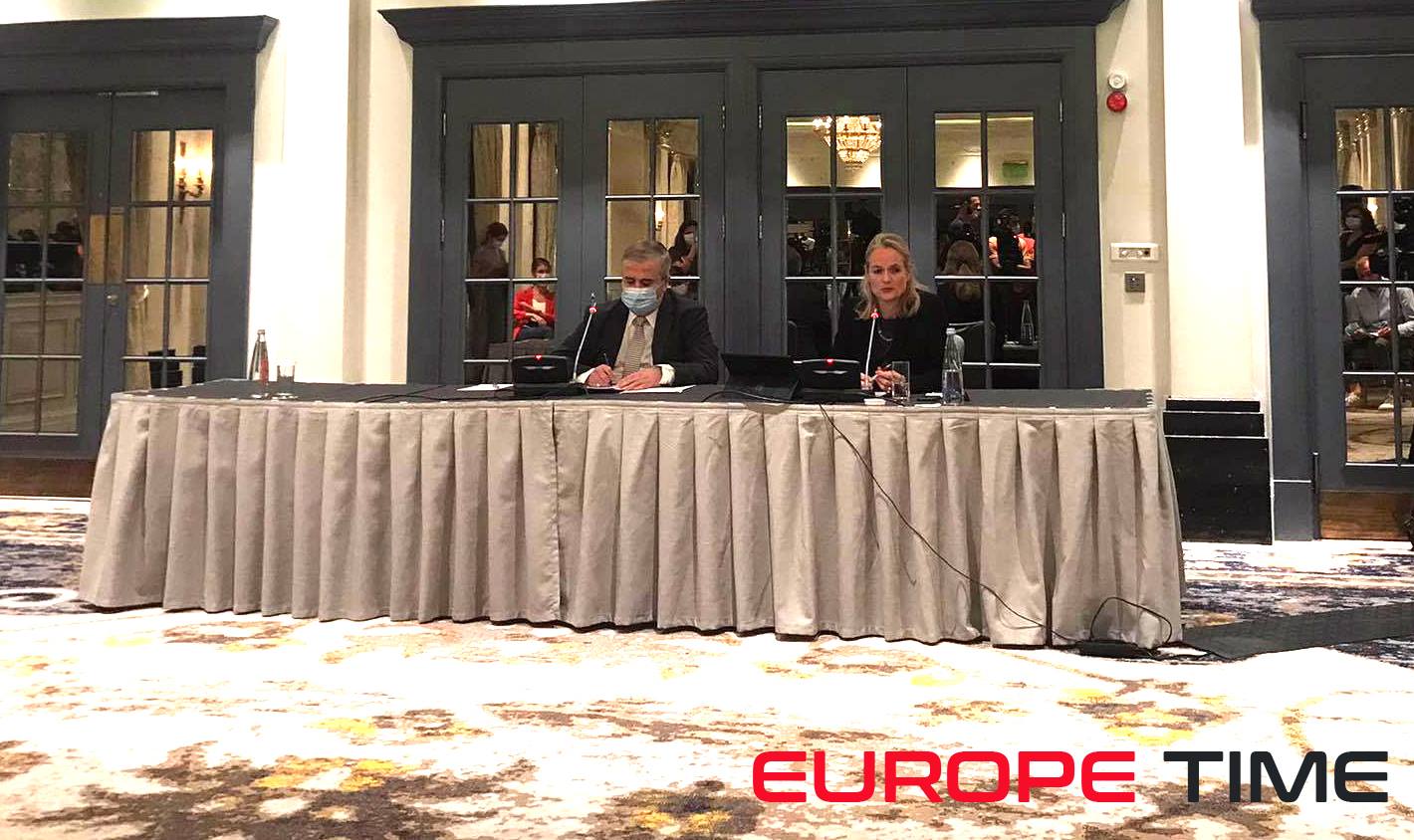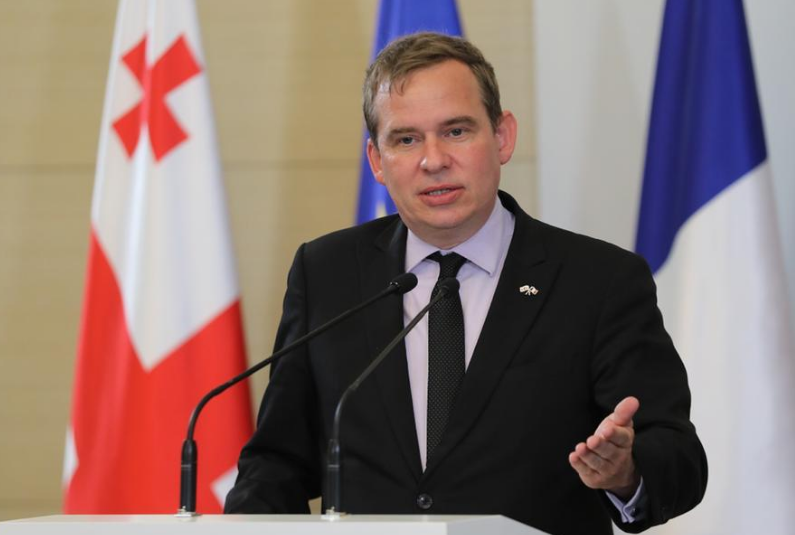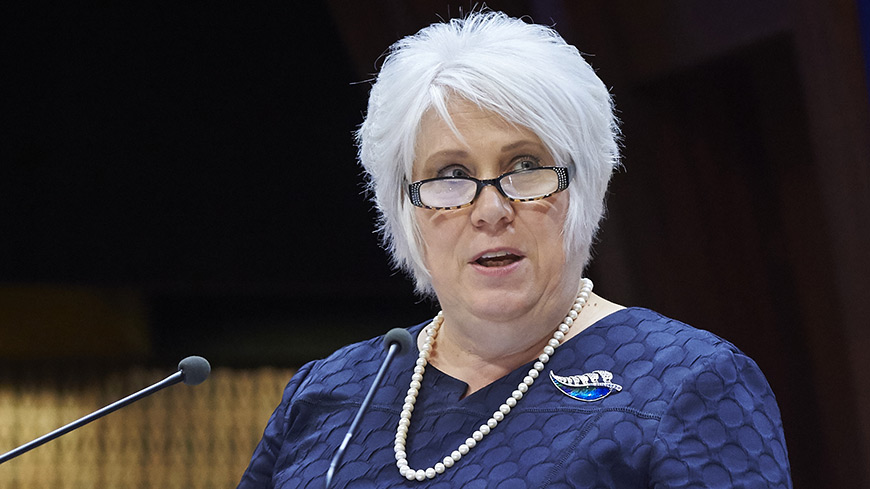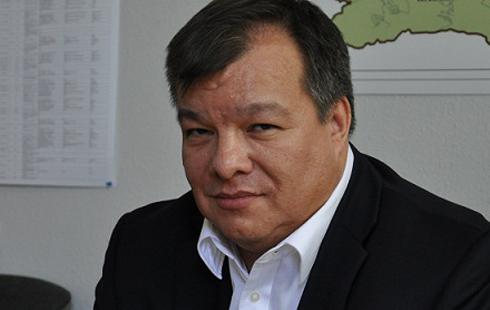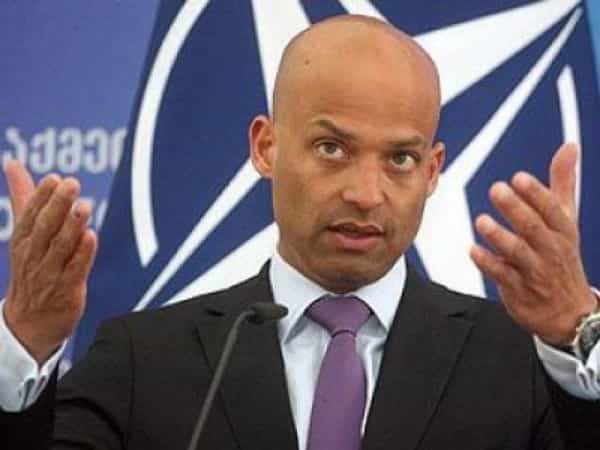Interview
Ben Hodges: It will take firm resolve by NATO and our partners, including Ukraine and Georgia, to make it clear to the Kremlin that we will not tolerate further violations of the sovereignty of European nations and international law
In an exclusive interview with Europe Time, Ben Hodges - Pershin Chair in Strategic Studies at CEPA (the Center for European Policy Analysis) (Commander of the US Armed Forces in Europe 2014-2017) talks about the ongoing processes on the Belarus-Poland border, the building-up of Russian troops on the Ukrainian border, and about the need of firm resolve by NATO and partners as well as a strategy by NATO, and by the USA, for the greater Black Sea region, including Georgia. ET: Good day Mr. General, thank you for finding the time to talk to us. There are so many things happening, I do not know where to start asking questions from. If we look closely at the current events, everything is interconnected. Beginning from refugees on the borderline between Belarus and Poland used as a threatening tool by Lukashenko in response to sanctions to the deployment of Russian troops and military equipment along the Ukrainian border. Against this background, Latvia, Lithuania, and Poland are starting to talk about the enactment of NATO Article 4 of. The statements of the NATO Secretary-General regarding Ukraine are also noteworthy. How would you assess these processes, given tensions have reached a peak, both in the South Caucasus and in Eastern Europe? An expansion of the current kinetic conflict in Ukraine is not inevitable…but the pieces are increasingly being put into place should the Kremlin decide to act. It was important for Secretary-General Stoltenberg to welcome Ukraine For Min Kuleba and to express NATO’s concerns about the situation. ET: What does Georgia look like and where is it in the current political landscape? The processes are quite disturbing and full of challenges in the country as well... As you know, the third president of Georgia is on hunger strike in prison, and for almost 14 days now, Georgian MP Helen Khoshtaria has been on hunger strike too demanding to take Mr. Saakashvili to civil hospital. This entire situation highlights the need for a strategy by NATO, and by the USA, for the greater Black Sea region, including Georgia. Georgia is an anchor on the eastern end of this strategically important region and is the place which should be the gateway between Europe and Eurasia. So, the US Government and NATO have an interest in seeing Georgia stable, secure, democratic, resistant to the Kremlin’s malign influence, and living up to its potential as a liberal, democratic society. I don’t easily comment on the internal politics of other countries, especially of friends like Georgia. But I am concerned by the terrible, disrespectful treatment of former President Saakashvili. Regardless of whether or not he is charged with offenses, to publicly humiliate him like this is unbefitting a nation that wants to be respected and wants to be a part of Europe. I am disappointed to see this shameful behavior. ET: The recent aggravation of the situation in Ukraine, the refugee crisis on the Belarusian-Polish border... How can events develop? I see the latest developments in and around Ukraine as a continuation - the next phase of what happened in and around Ukraine back in the Spring. Since that time, despite the false statements of Minister Shoigu, I think it is clear that there never really was a return of those Russian Federation (RF) forces back to their barracks - Russia left a lot of logistics in place after the Zapad 21 exercise. And there has been a lot of very sharp/blatant messaging over the last few months by President Putin and questioning or boasts by others about the future of Ukraine and its legitimacy. And now the latest movements/deployments… In other words, a steady escalation of capability and pressure in the region that never really stopped. This has implications for Georgia as well, given its proximity to Crimea and the Sea of Azov. We know that the Russians only stop when they are stopped. It will take firm resolve by NATO and our partners, including Ukraine and Georgia, to make it clear to the Kremlin that we will not tolerate further violations of the sovereignty of European nations and international law. ET: France has made a concrete and very clear statement of support for Ukraine in relation to Russia… In general, the EU is not really passive… I think that the weaponization of migrants along the border of Belarus with Poland, Lithuania, and Latvia is connected somehow to the RF activities in and around Ukraine, not coincidental, either as reconnaissance or disruption or distraction or all of the above. Very senior Latvian officials told me recently that they see this at least as reconnaissance. They've observed BLR (or RF?) Special Operations Forces out there timing the responses of Latvian border security forces to attempted incursions by migrants. They also think this could be a distraction, something to draw attention away from what they're doing in/around Ukraine. I was in Kyiv and Odessa on two separate trips in the last few weeks. They are very uneasy there. I think the EU is finally taking serious steps about the migrant issue on the border but their attention should be much more on the Kremlin, less so on Lukashenko. Lukashenko deserves any sanctions and other negative actions that come his way but there’s not much more to do to him. The key to the migrant/border crisis is the Kremlin, and right now they are feeling no pressure and have no incentive to stop it. Of course, Turkey is very unhappy that the EU is blaming them in part for the flights of migrants into Belarus which also plays into the Kremlin scheme exacerbating divisions inside the Alliance and/or between Turkey (key to the Black Sea) and Europe. The Suwalki Corridor is also a key part of this. I think that the weaponization of migrants along the border of Belarus with Poland, Lithuania, and Latvia is connected somehow to the RF activities in and around Ukraine, not coincidental, either as reconnaissance or disruption or distraction or all of the above. Very senior Latvian officials told me recently that they see this at least as reconnaissance. They've observed BLR (or RF?) Special Operations Forces out there timing the responses of Latvian border security forces to attempted incursions by migrants. They also think this could be a distraction, something to draw attention away from what they're doing in/around Ukraine. I was in Kyiv and Odessa on two separate trips in the last few weeks. They are very uneasy there. I think the EU is finally taking serious steps about the migrant issue on the border but their attention should be much more on the Kremlin, less so on Lukashenko. Lukashenko deserves any sanctions and other negative actions that come his way but there’s not much more to do to him. The key to the migrant/border crisis is the Kremlin, and right now they are feeling no pressure and have no incentive to stop it. Of course, Turkey is very unhappy that the EU is blaming them in part for the flights of migrants into Belarus which also plays into the Kremlin scheme exacerbating divisions inside the Alliance and/or between Turkey (key to the Black Sea) and Europe. The Suwalki Corridor is also a key part of this. This narrow bit of Polish-Lithuanian territory between Belarus and Kaliningrad is strategically vital because, as you know, it is the land-link between our Baltic Allies (LTU, LVA, and EST) and the rest of NATO/EU. If it were cut/blocked by RF and BLR forces then we’d have a real problem. There is the potential (not inevitable) but the potential for this situation with the migrants on the border of BLR (which is entirely a creation of BLR and RF) to escalate into a major issue, perhaps with kinetic action, at which time the RF might decide it has to step in due to the “humanitarian crisis” or something and, in the process “temporarily” close the Corridor, with its two roads and one railroad. Not likely but it’s completely feasible in my view. So, all in all, this is classic Russian “warfare” - use of all sorts of tools, leverage, threats, language, disinformation, migrants. ET: Energy resources and Russian gas are also one of the main tools of Russia, the example of Moldova is enough for it... Russian gas is clearly a “weapon” and that is part of the overall Kremlin mix as well, all of which is to unsettle/destabilize the EU, present Ukraine to the West as a “failed state”, and keep us all off balance. As a cold winter approaches and while Germany is led by a “care-taker” government until the new Coalition government is in place...hopefully by mid-December. The US administration is right to be concerned about this and I'm glad that Secretary Blinken is finally speaking plainly, and that Secretary of Defense Austin has spoken so plainly, including when he was in the Black Sea region a couple of weeks ago.
EU Spokesperson: We are supporting the three South Caucasus countries, including through the Eastern Partnership
In an exclusive comment with Europe Time Peter Stano, EU Spokesperson for Foreign Affairs and Security Policy spoke about statements relating to the proposal of a 3+3 format of cooperation for the South Caucasus. „The EU is aware of reports and statements relating to the proposal of a 3+3 format of cooperation for the South Caucasus. On our side, we are supporting the three South Caucasus countries, including through the Eastern Partnership. The EU remains committed to work on supporting peaceful and stable South Caucasus and it is actively engaged contributing to peace-building and post-conflict rehabilitation. It has played an important role in the release of prisoners and the handing-over of minefield maps. The EU has also supported people affected by the conflict with more than €17 million in humanitarian assistance, including for demining and early recovery. The EU is also ready to support border de-escalation and delimitation by providing technical assistance, as needed by the sides, and encourages connectivity and the reopening of economic cooperation in the South Caucasus. Looking ahead, a comprehensive settlement is necessary to put an end to more than three decades of conflict and suffering. To achieve this goal, the EU will continue to be in active contact with relevant international partners, particularly the OSCE Minsk Group Co-Chairs, and fully supports them in carrying out their mandate by working with Armenia and Azerbaijan on a comprehensive solution to all outstanding issues“, - Peter Stano said. Related article US Secretary of Defense: As regards the 3-3 proposal, Russia should focus on honoring the 2008 ceasefire commitments, before promoting any new discussion platform
MEP Rasa Jukneviciene: Russia`s plans are very clear. I would be very careful when Russia is on the side of one or another alliance
Diplomatic Crisis among Turkey and other western countries, the 3-3 proposal, and Russia`s role, EU-Georgian relations, and other issues were the topics of the Europe Time interview with MEP Rasa Jukneviciene, Lithuania Group of the European People's Party (Christian Democrats) Member, Vice-Chair of the EU-Georgia Parliamentary Association Committee. Rasa Jukneviciene is a Lithuanian politician, who has been serving as a Member of the European Parliament since 2019. She served as Minister of Defense of Lithuania from 2008 to 2012. _Do the upcoming elections have a special importance to the EU-Georgia relations? Every election is important if it is democratic. The EU members carefully follow the elections, including the quality of elections, in the member states. Of course, we are interested in the outcome of the election within the EU, because it touches upon us directly, but we are also closely following the situation in the countries like Georgia, in our Eastern Partnership states, because the political situation is not stable along our borders. Of course, like every nation, my country - Lithuania - also experiences political instability from time to time. But the situation in Georgia is different: the process of creating stable European-type political parties that are able to talk to each other and find compromise - that is taking very long. Political parties are too tied to personalities and their conflicts, instead of being focused on certain issues. So, the election is important for the future of Georgia and especially in terms of how ruling parties, (I mean everywhere, be it in Ukraine, Belarus, Russia or Georgian and other countries) conduct the election: whether they manage to refrain from using administrative resources, how they treat the opposition, and whether they act in a democratic way. So it is very important for Georgia and every country and we are following what is going on. _In this regard, what issue deserves special attention from Georgia`s partners? Judiciary System, the behavior of the ruling party, because they have a lot of resources, especially administrative ones, how money is issued and attitudes toward the opposition and justice. Supremacy of law is most important for every democracy, so here are the fundamental rights of a citizen, a fundamentally important issue for the future of Georgia. Without that, there is no possibility to think about membership in the EU and other democratic alliances. _It is noteworthy here that Georgia is preparing to apply for full EU membership in 2024. We were very much supportive when we got this message from the ruling party about their expectations and promises. As I understand it, they have decided to put it into their program. It is a very important message, but one thing is to make a good presentation or to make a good statement but another thing is to act as European. This is very important for politicians, for all sides to try to act as European, to demonstrate to the European Union partners that they are ready to apply for membership. Myself, I believe that the Georgian people deserve such decisions and you have friends in the European Union and they are very much in favor. Unfortunately, sometimes your politicians don`t understand that for your friends in the European Union it does not matter so much which political party is in the government. The most important is what they are doing. Sometimes I think that some politicians in the ruling party think that if we are criticizing them, it means we are working for the opposition. Of course, it is not like this and we would just like to have Georgia together with us in our family. So, I am hopeful. And I saw the results of the opinion poll that more than half of Georgians are in favor of the European Path and want Georgia to become a member of the European Union in the future. But for that Georgians need successful European reforms. And if Georgia is not back to the path of these pro-European reforms, especially the rule of law, it will be very difficult to believe that Georgia will be ready for such an appeal in 2024. _Acceleration of European integration is the goal of the Association trio countries Georgia, Ukraine, and Moldova. How do you evaluate their ambitions? We work very hard here, in the European Parliament to convince the politicians from different political groups that the Association Trio strategy is the only way to have the breakthrough in the Eastern Partnership. But it depends mainly on the countries. Today I see that Moldova is becoming a front-runner in its aspirations. Ithas very strong aspirations and the political will to become a European country by making the reforms. They are Europeans, but have to come as as close to the European Union as possible. Georgia has always been a front runner. Georgia has been the leader in the democratization in the region, but now many friends among the Greens, Liberals, Social Democrats, Conservatives at the European Parliament are very disappointed. Eespecially, after the agreement brokered by the EU’s Charles Michel's was rejected: when one opposition party refused to sign it and afterwards the ruling party annulled it. In such circumstances, what can the EU do for Georgia? The proposal from the highest level was rejected. Now everyone hesitates to try to do something. Of course, the Trio is very important, but disappointment is making the situation worse. More needs to be done. The EU aspirations are inseparable from the democratization of the country, justice, the rule of law, the fight with corruption, the necessary reforms. _The country also aspires to NATO membership. The experience of your country is also interesting in this regard. NATO is also an organization for democracies. So, this is also very important. I remember our aspirations to become a member of NATO before 2004, we had the same requirements on the table. NATO membership is not only about military reforms, it refers to the state efforts, including many other challenging issues. If Georgia gets back to the path of successful pro-European reforms, it means that Georgia will be closer and closer to NATO membership. So, this is almost the same process, but I am very much in favor of Georgia and Ukraine to become members of NATO. I think it was a mistake when in 2008 those countries were not invited to a membership action plan. But this is history now. Today, your country has to do even more to convince the leading countries in NATO to make this decision because we have Russia next to our borders, which is very much against NATO enlargement. It makes matters much more complicated.. So you need more successful reforms than before. It is a hard job. You need more active work to do in capitals.. Without good messages to the reforms of your country, it will not be a good environment to make decisions. If the countries in the European Union or NATO will see that they might admit into the club some trouble makers, some countries with big problems that are permanently in the political crisis, well, the politicians that are making the decisions might not have the best feelings about that. First of all, you need to have some kind of an agreement among the political parties, at least to start to speak. At least to start trying to find a common ground for this very nice nation and its future. At least to have a signature on a common statement, for example about NATO and EU membership, to elaborate necessary steps that the country needs to take in terms of the reforms and the political environment in the country. Without that agreement among the politicians from all sides of the political spectrum, with such battles when the leader of oppositions is in prison, when the former president is in prison, when justice is under the concern, you can make one appeal statement after another on how you want to become a member of NATO. If it is followed by bad news from Georgia, I am not sure if any politician will be happy to make such decisions on MAP or membership. Maybe I sound pessimistic, but I know that in the long term Georgia will be part of NATO, EU. However, on the other hand, today I don´t see a responsible political society, be it one or another political group to go together for that. And Russia, the Kremlin is doing also their job. They are trying to keep this chaos going. And this is what concerns you mainly, because we, your friends at the European Parliament, cannot even do more for Georgia when we, for example, are attacked by your Prime Minister. _You mentioned Russia and I`d like to ask you about the 3+3 format. As regards the 3-3 proposal, our international partners say that Russia should focus on honoring the 2008 ceasefire commitments, before promoting any new discussion platform... Russia`s plans are very clear. They want to keep Georgia far from NATO and the European Path. They think this is an alternative for Georgia. So it is Georgia`s choice to go or not. So I would be very careful when Russia is somewhere inside, on the side of one or another alliance. Georgia has to be back on the path of successful pro-European reforms and does not have to fight against European Union or someone in European Parliament. It is hard to say how to be back on the same track as it was proposed by Charles Michel and how to deal with European Union Leadership, but this is a task for your government. On the other hand, I think that Georgia needs some kind of restart at the highest political level, a new drive. Before your leaders take responsibility and stop this very brutal fight between Ivanishvili-Saakashvili, it will not be easy to overcome the situation. And only Russia will benefit from that situation. It will also depend on the people, if there is enough wise understanding of the importance of the free media, a stable political system, and the rule of law. It is up to the people. I understand that many people think about how to survive in the current economic situation, but Russia will not provide a better economy to Georgia. There is a different statehood in the European Union. Look at the Baltic states - today and before the membership. _How will NATO member Turkey's recent tensions with the West affect its future relations, given that Turkey supports Georgia's membership in the alliance? I think it will be solved. As I see, every side wants to deescalate the situation. Turkey is a very important country geopolitically. I am happy that Turkey is a great supporter of Georgia’s NATO membership and you have to keep this going and good relations with Turkey for Georgia are crucial. But on the other hand, we have to be very careful when it is something new with Russian participation, I mean Kremlin participation. I understand that some kind of disappointment comes when still MAP was not provided for Georgia, but you have to be patient. Of course, the time will come. Of course, NATO decisions are taken by all countries together, so it is not enough that, for example, Lithuania and the USA are supporters. We need consensus to make decisions. All countries are important in NATO.
Diego Colas: Georgia can only be stronger if democratic institutions are reinforced
`Georgia can only be stronger if democratic institutions are reinforced`, - Ambassador Extraordinary and Plenipotentiary of the French Republic to Georgia, Diego Colas, said in an exclusive comment with Europe Time. `Like we have said, together with my colleagues' ambassadors from the EU, we commend the Georgian citizens, as well as the dedicated electoral staff and observers, for taking part in this important democratic Rendez-Vous. We also welcomed that a full-fledged international electoral mission was deployed and very much supported its conclusions. In that statement, we noted with satisfaction that amendments to the electoral code that we had recommended had improved the legal framework, which is good. We have also pointed to a number of shortcomings that remain and that, in our view, require urgent additional efforts, before the second round as well as beyond. I have expressed my concerns several times in the past few months, especially about the need to improve the protection of journalists, without which there cannot be a healthy democratic European-style state. I have underlined the importance of a judiciary that is truly independent and of a robust commitment to the rule of law. My view is that, given the present issues and challenges that Georgia is facing, Georgia can only be stronger if those efforts are undertaken, if democratic institutions are thus reinforced, and if the judiciary and the rule of law are widely seen as worthy of respect and full of integrity", - Diego Colas said.
MEP Markéta Gregorová: Georgian people have shown that even in a tense atmosphere, they want to exercise their democratic rights in a peaceful way
`Georgian people have shown that even in a tense atmosphere, they want to exercise their democratic rights in a peaceful way`, - MEP MEP Markéta Gregorová (Group of the Greens/European Free Alliance) Said in an exclusive comment with Europe Time. "As we have observed, Saturday's elections have been mostly well-managed and calm. I thank the Georgian people for their approach to these elections - they have shown that even in a tense atmosphere, they want to exercise their democratic rights in a peaceful way. What we condemn is the situation just before the elections - with our own eyes we have seen advertisements inciting violence, heard testaments of pressure against various candidates, or the disproportionality of campaign funding between the government party and others. I do believe, however, that all the parties will now start to focus on fulfilling their promises, both to their citizens and to their partners, such as is the EU. We will observe it closely“, - MEP Markéta Gregorová said.
Ambassador Hubert Knirsch: All the parties that will come together to form the government in Germany, expressed their strong support for European integration
„The election is one step on the way to Georgia`s democratic development", - German Ambassador to Georgia Hubert Knirsch said in an exclusive interview with ‘Europetime’. „International observers observed organized voting days in line with legal requirements. On the other hand, they noticed an unequal playing field in the pre-election period. it was very difficult for smaller and new parties to compete with larger and existing parties, and they have given numerous examples of this. So, in the future, this is an issue that remains to be addressed", - Ambassador said. According to him, the observers undertook this very difficult task and carried out this election in an orderly and correct manner. The election is one step on the way to Georgia`s democratic development and it is an election that takes place under improved law as a result of the 19 April agreement, but it also shows that more things remain to be addressed and this remains the task of everybody concerned for parliament, the government, and especially for the political parties in their competition, in their interaction with each other, not only during the elections but also in the period before the next elections, which starts today", - Ambassador Hubert Knirsch said. As for the German elections and their influence on Georgia, Ambassador Hubert Knirsch said that all the parties that will come together to form the government in Germany have expressed their strong support for European integration. „We are observing the coalition-making process. All the parties that will come together to form the government in Germany, expressed their strong support for European integration. That was the issue that was important in the campaign, and this includes the EU's relations with its eastern neighbors, including Georgia. I am looking forward to future visitors from the German parliament and government who will bring these messages themselves", - Ambassador Hubert Knirsch said. Visa-Free and German Support were topics also Europetime`s interview with the German Ambassador to Georgia. He said that this is an issue that „we are observing all the time". Recently, the number of unjustified („unwarranted") asylum applications in Germany has risen. More recently, they have recently again been observing this and discussing it with the Georgian government, and this is a constant process", - Ambassador Hubert Knirsch said.
What are MEPs' expectations for the upcoming October 2 local polls
Elections on October 2nd and their expectations were the topics of the exclusive comments by the MEPs. For example, Markéta GREGOROVÁ calls on all the running parties to try and calm their voters and create an atmosphere of respect towards each other. Andrius Kubilius wants the election to bring no further division, but a way to return to normalcy and focus on pro-European reforms in Georgian politics. Viola Von Cramon-Taubadel hopes that all parties will realize the momentous significance of these elections and work together towards a Georgia that is based on cooperation and not polarization. Europe Time presents their opinions: Markéta GREGOROVÁ Group of the Greens/European Free Alliance There has been an ongoing spurge of violence before the elections, and a fear that it will continue after them. I call on all the running parties to try and calm their voters and create an atmosphere of respect towards each other. Every party had a chance to show what they stand for-now it is up to the citizens to cast their ballot and make their decision, not up to the parties. I do hope that the observation missions will result in successful elections, void of any misdemeanor. Andrius KUBILIUS Group of the European People's Party (Christian Democrats) I wish that the election would bring no further division, but a way to return to normalcy and focus on pro-European reforms in Georgian politics. Georgian Dream holds leading responsibility for that as the ruling party at the moment. It can contribute to stabilization by fulfilling its commitment under the April 19 agreement to hold national elections if in local elections it gets less than 43 percent of votes. Viola VON-Cramon-Taubadel - Group of the Greens/European Free Alliance My expectation and hope are that all parties will realize the momentous significance of these elections and work together towards a Georgia that is based on cooperation and not polarization. Just like Georgian voters, I also expect that politicians will learn to put the country’s interests above party interests and push important changes through parliament instead of the streets. On 2 October, the European Parliament will observe the local election in Georgia as part of the International Election Observation Mission, together with the OSCE ODIHR and the Council of Europe’s Congress of Local and Regional Authorities. The delegation from the European Parliament is composed of seven MEPs: Michael Gahler (EPP, Germany) – Chair of the delegation Miriam LEXMANN (EPP, Slovakia) Marina KALJURAND (S&D, Estonia) Katalin CSEH (Renew, Hungary) Marketa GREGOROVA (Greens/EFA, Czechia) Jordi SOLÉ (Greens/EFA, Spain) Anna FOTYGA (ECR, Poland). The MEPs arrived in Georgia on 29 and 30 September.
Ben Hodges: The Kremlin is already alarmed at the potential for growth of Islamic extremism in Central Asia. Iran is not likely happy to see this instability, though they of course have no sympathy for the US or our allies
In an exclusive interview with Europetime, Former commander of the United States Army Europe, Lieutenant General, and the Pershing Chair in Strategic Studies at the Center for European Policy Analysis (CEPA), Ben Hodges talks about the mistakes made by the US administration in Afghanistan, the changing political landscape in Afghanistan and its impact on the rest of the region and Georgia, the need for the US to develop a comprehensive strategy for the greater Black Sea region to help Georgia achieve its priorities. Given what has been said, Ben Hodges also discusses what Georgia must do more to make itself attractive to investment. _in our interview with you, we discussed in detail the issue of Afghanistan - whether America should leave Afghanistan or not. We have witnessed how the processes have developed, with lightning speed and dramatically to some extent... How would you assess, first, the withdrawal of the allies from Afghanistan and then pulling out in such a form? In force majeure, after 20 years? I agreed with the decision of the president to withdraw. Staying longer, without dramatic changes to the overall strategy, was never going to change the eventual outcome. But the Administration could have done more to prepare for the large number of refugees seeking safety, especially those who had worked for or with us. And the Administration should have done a better job of consulting with our allies and partners about the timing of the withdrawal. Still, I must say I’m very impressed with the courage and skill of the pilots and soldiers and marines and diplomats on the ground who actually executed the withdrawal. _ Afghanistan, found in the hands of the Taliban after 20 years of vicissitudes, what does it mean? What is the lesson and experience for the Americans? We made several mistakes, and I was personally a part of those mistakes. First, we/I believed that Pakistan was an ally. Clearly, they were not; and we ignored the warning signs of this for too long. Second, we made a huge mistake diverting to Iraq right at the time we were about to conclude the original mission in Afghanistan. Third, the US government should have imposed a tax on all American citizens to pay for the wars in Afghanistan and Iraq. The vast majority of Americans were not impacted by these wars unless they had family members involved or unless they lived near a large US military base. The result of this was that there was very little pressure from the public on any of the Presidential Administrations or the Congress to address these wars, get them right, or conclude them. Fourth, we made a mistake in the model we used for developing the Afghan security forces. We designed them to look like us, which means they would have to have overwhelming firepower, air support, endless logistics, and thousands of contractors to maintain so much equipment. This model collapsed when we pulled all of that out. I failed to realize this when I was there because I did see good, professional Afghan officers. But I failed to realize what I was actually seeing with my own eyes… The best Afghan unit I saw looked a lot like Taliban – pick-up trucks, no helmets, led by a US Army Green Beret lieutenant colonel. Finally, we lost sight of our original purpose – to deny safe haven for AQ in Afghanistan. The decision to transition to nation-building came later and that’s why we stayed for 20 years trying to do something for which we had not originally planned and which was never explained by any of the Presidential Administrations to the American people. _ Who is the winner or the loser in the Afghan process? What are the dangers of Taliban rule? Will these processes contribute to the growth of Russia’s influence over Central Asian countries? And will Russian-Chinese influences be further consolidated? The biggest losers in this whole situation are the Afghan people, especially but not only women and girls. Pakistan will regret that they supported the Taliban because now they have even more refugees inside Pakistan and more instability on their western border. China will pay for protection and access to mineral resources in Afghanistan. They will not care at all about human rights in Afghanistan, but they will have a concern about the influence of Islamic extremists on their own Uighur population. The Kremlin is already alarmed at the potential for growth of Islamic extremism in Central Asia. Iran is not likely happy to see this instability, especially given the Shia-Sunni frictions, though they of course have no sympathy for the US or our allies. _One of the directions of Georgia is also to become a transit corridor and a hub between Asia and Europe. It is important for the country to attract cargo from Central Asian countries through Georgia. Will the changing political landscape in Afghanistan, as well as Russia’s probably growing influence in Central Asian countries affect the rest of the region and Georgia, at least in this particular direction? I imagine there will be some impact but I’m more concerned about the lack of serious effort by the government of Georgia to make Georgia more attractive to Western investment… So much potential there but it has not been developed due to internal Georgian political problems. _It is clear that people in every country should want change and strive for the better and fight for it. But often, for one reason or another (obscure ugly rules, misinformation) which, in fact, is an integral part of hybrid warfare in this era, people fail to express themselves, to protest, or to fight. The pandemic seems to have divided the world rather than united it. Handling Russia and similar countries is like fighting a pandemic: you either unite and defeat what may sacrifice you tomorrow, or you lock yourself in your shell and think only of your own survival, which is temporary, because, reinforced and mutated, it will find you again and haunt you… So, I was wondering, isn’t it time for the EU and NATO to more effectively encourage the efforts of countries aspiring to the West? I believe Georgia should already be a member of NATO and that Ukraine should be on a very clear path to NATO membership. But there is more important work to be done now, by Georgia and Ukraine internally and by the USA to develop a strategy for the greater Black Sea region. Until the USA has further developed such a strategy and developed the necessary implementing policies of diplomacy, economy, and security with our friends in Georgia and Ukraine, I am not optimistic that membership is close at hand. Georgia must continue to do more to improve its own resilience against Kremlin disinformation and malign influence, but I sense that over the past year this has not gone as far in that direction as it should. _There is a feeling that Europe is most concerned about the issue of refugees when talking about Afghanistan. It is because of this sensitive issue that ultra-radical forces in the West are coming to the fore with populist slogans, which then raises even more problems. My question is whether the problem is only refugees or also illegal migration, weapons, drug trafficking, and terrorism. In your opinion, are these problems more complex and how can a solution be found? No doubt European nations and also the USA, are concerned about the flow and impact of refugees, and some nationalists and right-wing extremists will attempt to use this for their own selfish political aims. But in the case of Afghanistan, we have a responsibility to open our doors and find ways to accommodate as many of them as possible. Many of those who left Afghanistan are educated, professional and industrious, exactly the sort of women and men we all need in our own countries anyway. _In an interview with ‘Europetime’, Acting Assistant Secretary of State Philip T. Reeker said that the construction and development of large infrastructure projects, as well as direct American investments, are important for the country. Earlier, Senator Rob Portman told us that work is underway to open an American financial institution and on a free trade agreement with the United States. The question is what does the implementation of all this and the pace of implementation depend on? These depend primarily on two things: 1) is the development of a broad strategy for the greater Black Sea region that will address diplomatic and economic objectives and priorities and resources as well as military considerations. This strategy is essential if we are to invest time and money so that they make sense. 2) is that Georgia must do more to make itself attractive to investment; transparency on financial and legal transactions, meeting international standards for business investment and banking, and ensuring that money is not lost or illegally redirected into the accounts of a few rich oligarchs who are not truly interested in an improved future for the young people of Georgia.
Congressman Alex Mooney: The US-Georgia free trade relationship is a good prospect and opportunity
According to Congressman Alex Mooney in an exclusive interview with Europe Time, the US-Georgia free trade relationship is a good prospect and an opportunity. „I think it’s going to be a good prospect as free trade is something that is already happening in the world. I think free trade between our countries is a good possibility“. As for the issue of direct investment in Georgia, Congressman Alex Mooney answered a question in this regard. „I think it’s in America’s interest, in the world’s interest to have this kind of investment,", - Congressman Alex Mooney said. Exclusive: Senator Rob Portman: We should encourage more direct investment in Georgia Exclusive: Philip Reeker: The Anaklia Deep Sea Port and all the biggest infrastructure projects are a great opportunity
MEP Viola Von Cramon-Taubadel: The outcome, as well as the post-election events, will largely define the direction of EU-Georgia relations
EU-Georgia relations and other actual issues were a topic of the Europe Time interview with MEP, Viola Von Cramon-Taubadel, Group of the Greens/European Free Alliance. She stated that the outcome of the election, as well as the events that follow, will largely determine the direction of EU-Georgia relations. This is why we are preparing a full-fledged observation mission from the European Parliament. I know that many other observers are also planning to come. This is a strong signal for everyone in Georgia who wants to live in a democratic country, "Viola Von Cramon-Taubadel said. Europetime spoke to MEP Viola Von Cramon-Taubadel: _What do the current circumstances in EU-Georgia relations specify? I believe that Georgian-EU relations definitely have had better times. Unfortunately, currently, we see a strong anti-EU disinformation campaign that is trying to sway public support for the EU. As a shadow rapporteur for the European Parliament’s special committee fighting disinformation, we take this subject very seriously. Similar disinformation campaigns can be observed in Ukraine and Moldova and can be traced to Russia. In addition, Georgian Dream’s decision to withdraw the signature of the agreement that the EU and President Charles Michel personally negotiated and where we invested so much energy has further harmed the relations between the EU and Georgia. The EU sees trust as a bedrock for stable partnership and breaking promises seriously breaches this trust. _How do you evaluate the US policy in the region and towards Georgia? The EU and the US share the same values and interests; this is particularly prevalent in Georgia. We have the same goals too: support the building of democratic institutions, strengthen the independent and transparent judiciary, make sure that the fundamental freedoms and rights of the people of Georgia are protected and respected. The EU and the US ambassadors, through their hard work, prepared the ground for the April 19th agreement. The Agreement is still in place with or without Georgian Dream’s signature. As for the region, during the most recent phase of the Nagorno-Karabakh conflict, both the EU and the US were largely absent. This, regrettably, allowed Russia to strengthen its positions in the Caucasus. Unfortunately, such a development further complicates Georgia’s security. _What could you say about the significance of the local elections? This election is extremely important despite being called "local elections". It has ramifications on national and international levels. The outcome, as well as the post-election events, will largely define the direction of EU-Georgia relations. This is why we are preparing a full-fledged observation mission from the European Parliament. I know that many other observers are also planning to come. This is a strong signal for everyone in Georgia who wants to live in a democratic country. Related article: MEP Viola von Cramon-Taubadel: I am afraid, after Georgian Dream's decision to "annul" the April 19th agreement, Georgia is farther from the EU than it was 3 months ago
MEP Marina Kaljurand: We still expect Georgia to fulfill what would have been the criteria for the disbursement
The EU tranche was a topic of the European Time comment with MEP, the Chair of the delegation to the EU-Georgia Parliamentary Association Committee, Marina Kaljurand. „Georgia is a sovereign country and we respect the Georgian authorities’ decision not to request this tranche of EUR 75 million EU macro-financial assistance, which was due to be conditionally disbursed by 30/09. We also understand the economic arguments justifying this decision, i.e. rapid economic recovery. That said, even if Georgia does not request the remaining tranche, we still expect them to fulfill what would have been the conditionality criteria for the disbursement, notably the reform of the justice sector (also pinpointed in the 19 April agreement brokered by Charles Michel)“, - said MEP Marina Kaljurand. The EU calls on the Georgian authorities to uphold their reform commitments. The EU’s assistance to Georgia remains conditional on progress on key reforms. Related article: MEP Markéta Gregorová: The funding has been conditional on fulfilling the political pre-conditions MEP Marina Kaljurand: we still expect them to fulfill what would have been the conditionality criteria for the disbursement, notably the reform of the justice sector (also pinpointed in the 19 April agreement brokered by Charles Michel)“, - said MEP Marina Kaljurand.
MEP Andrius Kubilius: The government of Georgia understands that it will not get the loan proposal from the EU Commission because the government is not able to fulfill the conditions
The EU tranche and other current issues were the topics of the Europe Time interview with MEP and Co-President of the Euronest Parliamentary Assembly, Andrius Kubilius. He said that the Georgian economy needs financial resources to be invested in all the developments that are needed for the country and its citizens. So, when the government declares that they do not want to take that loan, of course, it is a big mistake that simply makes Georgian people suffer more: ET: How do you evaluate the current situation with EU macro-financial assistance? Today, the Prime Minister of Georgia stated that the country would refrain from taking the EU loan. Before that, the Georgian government was reminded by both the European Commission and the President of the European Council of the need to meet the conditions. It means that the government understood that it would not get the loan proposal from the EU Commission because the government was not able to fulfill the conditions that were attached to that loan. First of all, the conditions are on the selection of judges, and, second, on the implementation of the so-called Charles Michel agreement. When the government signed an agreement and promised to implement it, there was criticism from the experts of the commission that the government was not implementing part of that agreement, which was about reforms of the court system and the appointments of new judges. So, that was what the government did. It was against the agreement. The Georgian economy needs financial resources to be invested in all the developments that are needed for the country and its citizens. So, when the government declares that they do not want to take that loan, of course, it is a big mistake that simply makes the Georgian people suffer more. They will not get this financial possibility, which is sorely needed in Georgia. These reforms are important for Georgia to be ready to apply for a membership application. If Georgia is not implementing what the EU has requested on the reforms of the court system and the appointment of judges, it means that this government is not bringing Georgia closer to the EU. When the government declines the request of the EU institutions to make reforms in the court system, it shows that the government does not have a European type of rule of law system or European type of transparency in the court, which means, unfortunately, the Georgian people are declining the possibility of having a much more effective, much more transparent, and trustful rule of law system in Georgia. Second, the ruling party decided to declare that they were not going to implement the whole agreement. Now the Georgian government has declared that they do not have a loan that has such conditions, which, unfortunately, means that the government has very clearly declared that they are not going to implement the conditions attached to the loan. These conditions are very important for Georgia, first of all. And again, the Georgian government is losing international trust and international respect. ET: What does it signify for Georgia and what does the country look like? Unfortunately, we have been worried for quite a long time about the political situation in Georgia and how fragile the Georgian democracy is. Of course, European institutions spent a lot of effort assisting Georgian political parties, including the ruling party, to stabilize the situation, and Charles Michel played an important role. But as we can see, first of all, the ruling party is not respecting the efforts of EU institutions, and that is what is causing much more trouble when we are looking into how things can develop in Georgia. The Georgian government declared that they will make a formal application for EU membership and provide good conditions for that application to be discussed with a positive outcome among EU institutions and EU member states. The Georgian government needs to win back international respect and international trust. With all the crisis, with all the recent developments, not respecting the so-called Charles Mishell agreement, unfortunately, the Georgian government and the ruling party are damaging this international trust and international respect towards Georgia, and it could become a real obstacle, a real problem in 2024, to having successful discussions on Georgian applications. ET: Local elections may have special significance in these circumstances. We expect that those elections will be executed transparently according to all the best European standards. That was one of the goals of the Charles Mischel agreement. The ruling party decided not to implement this agreement, but I hope that elections will be organized in the best way. The ruling party promised that if they did not get some percentage (40%) during the local elections, there would be a national election. So it will be very important that the ruling party stick to that promise, and in any case, it looks like early parliament elections would be a good solution to this deep political crisis in Georgia, which was very difficult to resolve, even with the participation of the EU leadership. So, perhaps, Georgians need to find a way to get out of the political crisis. It was a good agreement to solve the crisis, but the biggest damage to implementing this agreement was done by the ruling party when it declared they were not going to implement it. Of course, perhaps it was also the mistake of the biggest opposition party, (UNM) not to sign that agreement. No, we have a very unclear situation. There is no clear path to how Georgia can get out of the political crisis. Again, we can just urge the ruling party to nevertheless stick to what they promised. In such a way, local elections are becoming, in some ways, not only important for local elections, but also as a possible step in a national political crisis and national political division. In my opinion, in the deep political crisis that we are experiencing now, I think new parliament elections could be a good and effective way out of the crisis and bring back walking democracy, which is sorely needed in Georgia. And Georgia needs to be seriously evaluated as a possible candidate for EU membership in 2024. ET: At the same time, how do you evaluate the efforts of the Association Trio countries, including Georgia? They emphasized a unified strategy, beginning with signing the declarations in Kyiv and then in Batumi. I am very much in favor of this association trio initiative because we have been proposing this association trio from the European Parliament side since 2019. It's good that it's started to move ahead. They deserve a much more ambitious approach from the EU side. But also, what would be very important is that those countries, especially Georgia, would try their best individually to show that they can make reforms and democracy effective because the trio strategy will not resolve those issues, which can be resolved only by individual countries. So, Ukraine, Georgia, and Moldova need to do their homework. Moldova, after the elections, has the possibility of moving forward much more rapidly. Georgia appears to be losing the momentum of reforms that it was able to demonstrate before the political crisis. It may be critical for the three countries to make significant progress toward EU integration before 2030, but no mistakes can be made at the level of national states. Unfortunately, Georgia is showing a bad example of how things can become very difficult. The Association agreement was a good instrument for Georgia, Moldova, and Ukraine to move forward. The financial assistance that is coming is very important, but we would like to see from the EU side a more clear and more ambitious policy towards the Eastern Partnership, especially towards the Trio countries, which should be similar to what the EU implemented in the Western Balkans region. Western Balkan countries have clear dates to become members of the EU. That clear vision is helping, first of all, Western Balkan countries to keep their motivations at a high level. Unfortunately, that is not the case for the Eastern Partnership. The EU is still not able to promise a much clearer vision of what is next. We are trying hard from the European Parliament side to ask for proposals from EU institutions, especially during the forthcoming summit, to have much clearer and more ambitious language and much clearer steps in how the next steps of the trio countries' integration will be implemented. To give these countries a clear path, what is next? We discuss different scenarios of how things can move forward. One of the scenarios is to propose "intermediate status", which could be similar to some countries, (Norway and Switzerland, which are not part of the EU). I mean that countries like Georgia, Ukraine, and Moldova could have also benefited from membership, like being integrated into a single market, getting all the possible financial support, but not having the right to participate in EU institutions.
MEP Markéta Gregorová: Political actors in Georgia should come to one table and come to an agreement
The April 19 Agreement and political developments in Georgia were topics of the Europe Time interview with MEP Markéta Gregorová (Group of the Greens/European Free Alliance). She encouraged political actors to come to one table (Georgian Dream, UNM, and all the others) and come to an agreement: Markéta Gregorová: Honestly, even with Charles Michel being in Batumi before the Georgian Dream decision and giving all this time to a relationship between Georgia and the EU, this kinda seems like a beat in the face of the EU. Because this is considered to be an EU-mediated agreement, simply annulling it shows what Georgian Dream thinks of the relationship with the EU. And it is very disappointing. Of course, there are several possibilities, and microfinance assistance is the obvious one. However, of course, this is something that is done in the standard legislative procedure of the EU. So, it is not something we can do immediately now. It is something we can say that will happen and then when the legislative procedure is going, we can somehow update it based on the current events. Of course, this is also something to discuss among the commission and the council. The problem of complication here is that most of the employees and people from the council and commission are on holiday because the EU institutions are on holiday during August. So, that complicates a swifter reaction. We are going to get in contact with them and see what can be done, but as far as I can see, the atmosphere around the EU institutions is quite different. I feel like this has taken the attention of all of us, and this will definitely have a strong reaction from the EU. _Your colleagues call on Georgian Dream to return to the April 19 agreement, but they are not going to change their decision. In that case, there needs to be an answer from the EU. We cannot be just a tool that is being used when it's convenient. We can be partners, but it is not something that can be used. Of course, if they change their decision, this will be very helpful to the situation, but I do not have any indications that this is going to happen, but that does not mean that I do not wish it. _What would be your advice to the political actors in Georgia? The disagreement between the Georgian Dream and UNM is creating more problems and more divisions and I think they should overcome this division because it is not about them, it is about the country and their citizens and they should come to one table (Georgian Dream, UNM and all the others) and come to an agreement. So, it is helping the country to really stabilize because we did not even like live pandemic situations and problems yet and there are already other problems about the existence of a democratic system and that is very disappointing. Georgia has a plan to apply for EU membership by 2024. We also remember statements that Georgia is farther from the EU than it was 3 months ago. In this regard, how do you view these perspectives? It might seem so, but I do not think that something has changed in how governments and political actors think about the European Union and Europe. So, maybe this will be hard to say, but the fact that the government put it on paper and they have the ambition to ask for accession to the European Union in 2024, I think it has been just on paper from the beginning and it has never been on their mind. Maybe I am not right and I will be happy not to be correct, but so far it seems like that. It is on the paper, but it is not on their actions. Of course, till 2024 is three years. So, there can be all of these developments. We have seen that developments have been just a couple of months ago. But the politics would need to change greatly for the EU to believe the Georgian government. They want to honestly join the European Union. _Will you try to synchronize the decisions with the United States? As I have seen their statements what they think, the US is more disappointed with the developments and exasperated, to be honest. Yes, the talks between the EU institutions and the US are going, but of course, I cannot tell right now what will be the outcome because they do not know the outcome themselves yet. But as for cooperation, we want to help to solve the situation, but we also realize that this is something that we cannot force Georgia to do if the government does not wish so. So, there needs to be bilateral or trilateral will to change the situation.
MEP Andrius Kubilius: I hope all sides in Georgia understand that increased tension puts the country’s future and progress of European reforms at stake
I hope all sides in Georgia understand that increased tension puts the country’s future and progress of European reforms at stake - said Co-President of the Euronest Parliamentary Assembly Andrius Kubilius in a comment with the Europetime. „GD is loosing international trust and, unfortunately, the same is happening with Georgia. The withdrawal of the ruling party from the hard-won April 19 agreement is sending a bad signal. I do not see how this step helps diminish polarisation and ensure political dialogue. International partners are willing to help Georgia on her European reforms path, and the EU has demonstrated that in the personal leadership of Charles Michel, the President of the European Council. The April 19 agreement provided a good basis for that in preparation for the elections. Now there is a void. I hope all sides understand that increased tension puts the country’s future and progress of European reforms at stake and will find a way to overcome the disagreements“, - said Andrius Kubilius. MEP Viola von Cramon-Taubadel: I am afraid, after Georgian Dream's decision to "annul" the April 19th agreement, Georgia is farther from the EU than it was 3 months ago Exclusive: James Appathurai: The decision by Georgian Dream to withdraw from the April 19 Agreement is deeply regrettable Exclusive: Diego Colas: After July 5, the issues on which I focus most of my attention are freedom of the press and the security of journalists, protection of minorities, judicial reform US Embassy: The United States is deeply disturbed and exasperated by Georgian Dream`s withdrawal from the April 19 Agreement
MEP Viola von Cramon-Taubadel: I am afraid, after Georgian Dream's decision to "annul" the April 19th agreement, Georgia is farther from the EU than it was 3 months ago
`I am afraid, after Georgian Dream's decision to "annul" the April 19th agreement, Georgia is farther from the EU than it was 3 months ago`, - Viola von Cramon-Taubadel, Member of the European Parliament, Lead member for Georgia at the European Parliament’s Democracy Support and Election Coordination Group (DEG) said at a news conference. According to her, it does not happen for the first time when the Georgian Dream does not fulfill its promise. `First of all, I want to start by expressing my support to you, Georgian Media, and especially to those 53 journalists who were brutally attacked by violent groups on July 5th. Georgian Dream's statements that failed to properly condemn the impunity or even emboldened the perpetrators are a very dangerous sign of backsliding democracy. Protecting Media, even one as polarized as it is in Georgia, is a fundamental EU value. Other EU values are embodied in its motto "United in Diversity". Diversity means protecting everyone and everything - culture, traditions, religion but also minorities. With all its diversity and regard to the fundamental values of all human beings, Georgia is welcome and respected in the EU. I am afraid, after Georgian Dream's decision to "annul" the April 19th agreement, Georgia is farther from the EU than it was 3 months ago As a lead Member of the European Parliament’s Democracy Support and Election Coordination Group (DEG) for Georgia, I was tasked with leading a high-level mission to support dialogue between Georgian political parties and share European experience. After our full-scale mission in July was canceled due to a very high number of COVID-19 cases, I decided to hold the meetings at the Georgian Parliament without other members of our delegation. Right at this moment, the Georgian Dream made unexpected and, in my opinion, the harmful decision for Georgian interests and withdrew from the agreement. This is in the end why I decided to cancel my meetings at the Georgian Parliament. The April 19th agreement was and is a fundament for the European Parliament's democracy support activities with the Georgian Parliament. This is not the first time the Georgian Dream breaks its promise. "Annulling" the agreement irreparably breaches trust and renders the Georgian Dream unreliable. The excuses for "annulling" the agreement are unpersuasive and unserious. Georgian dream did not fulfill its obligations – appointment of judges without "ambitious judicial reform" is a good demonstration of that. This regrettable decision did not benefit Georgia, its people, its international friends. Georgian Dream's decision benefited the Kremlin. It is clear that we cannot go back to "business as usual". The EU will need to reconsider its relations with the Georgian Government. It is also true that UNM's unconstructive actions and refusal to sign the Agreement gave Georgian Dream a convenient pretext. The people of Georgia deserve better, they deserve politicians who put the country's interests above everything else. Hereby, I commend all opposition parties that stay committed to the agreement and to the obligations they have taken. Lastly, in this context, the upcoming local elections have become even more significant. The EU stands with the People of Georgia in their struggle for a just and democratic state. This is why every Georgian need to exercise their constitutional rights and vote in the local elections. The EU will do everything possible to makes sure that our observers are on the ground and contribute to the transparent elections“, - said Viola von Cramon Taubadel. Exclusive: James Appathurai: The decision by Georgian Dream to withdraw from the April 19 Agreement is deeply regrettable Exclusive: Diego Colas: After July 5, the issues on which I focus most of my attention are freedom of the press and the security of journalists, protection of minorities, judicial reform MEP Andrius Kubilius: I hope all sides in Georgia understand that increased tension puts the country’s future and progress of European reforms at stake US Embassy: The United States is deeply disturbed and exasperated by Georgian Dream`s withdrawal from the April 19 Agreement
Diego Colas: After July 5, the issues on which I focus most of my attention are freedom of the press and the security of journalists, protection of minorities, and judicial reform
"I agree with Charles Michel that upholding the content of the April 19 agreement, in particular in-depth judicial and electoral reforms, offers the best way to strengthen democratic institutions and the rule of law in Georgia,"- Ambassador Extraordinary and Plenipotentiary of the French Republic to Georgia, Diego Colas, said in a comment with Europe Time. „I am not very interested in speculating on the result of the next local election, or in discussing what should be the consequences of this or that score in these elections. I agree with Charles Michel that upholding the content of the April 19 agreement, in particular in-depth judicial and electoral reforms, offers the best way to strengthen democratic institutions and the rule of law in Georgia. After July 5, the issues on which I focus most of my attention are freedom of the press and the security of journalists, protection of minorities against violence and intimidation, extremist groups undermining Georgia’s democratic public order, judicial reform. These are the issues where I hope to see strong signs of commitment to European and Western values from everyone, starting with the authorities", - Diego Colas said. US Embassy: The United States is deeply disturbed and exasperated by Georgian Dream`s withdrawal from the April 19 Agreement
Tomasz Kijewski: I think it is a great time to speed up Georgia’s European integration process
Batumi Conference and trio countries' European path were topics of the Europe Time interview with Tomasz Kijewski, president of the Warsaw Institute. Tomasz Kijewski graduated from international relations at the University of Lodz (scholarship at the Center for Transatlantic Studies in Maastricht, the Netherlands) and post-graduate studies at the National Defense University in Warsaw. Graduate of the national security study program (PASS) at the George C. Marshall European Center for Security Studies (Garmisch-Partenkirchen / Washington DC). He completed a course at the International Energy Agency in Paris and was an International Visiting Advisor on Energy in Calgary. For many years, he served as a diplomat, actively promoting Polish interests in North America. The areas of Tomasz’s expertise include hybrid warfare and asymmetric conflicts, counter-terrorism, and energy security. He is currently preparing his doctoral dissertation (Ph.D.). _What are your expectations from the Batumi conference? We would like to have a deeper understanding of the Georgian Foreign Policy and how Georgia can move faster towards EU integration and strengthen cooperation with European and Western partners. I think it is a very important question right now. Despite the fact that Georgia is on its way to European integration, there are a lot of challenges. _What are the main challenges? The main challenges are always connected with internal policy and the ability to accommodate this path for integration. So, economic development and international cooperation are also key issues. We should focus on building stronger cooperation. This is what we have to do. Not so much on external actors, but strengthening cooperation within institutions, within countries, between Georgia and European Union countries and other western countries. _How do you evaluate trio countries' ambitious goals? I think that the three countries are the most advanced countries of the eastern partnership on their way to European integration. So, I think this is an important time. We should speed up the process because different political changes can happen as we observe the European political landscape. This is a time we should use. We would like to have a deeper understanding of the Georgian Foreign Policy and how Georgia can move faster towards EU integration and more cooperation with European and western partners. I think it is a very important question right now. Despite the fact that Georgia is on its way to European integration, there are a lot of challenges. This is a time we should use. The talks and the process in Georgia are getting closer to the European structures that have been established a long time ago. I think it is a great time just to speed up the integration. It should be done in cooperation between Georgia and the European Union. At the same time, in my opinion, the European Union and other western countries should be flexible when it comes to respecting cultural differences in countries like Georgia, in countries like Poland, and others. The standard of democratization is very important and it should be respected, but I think we can not force countries like Georgia to just make one model of democracy in this sense. So, I think the differences in cultural and political approaches should be preserved and should not be an obstacle to integrating into European structures.
Europetime spoke to MEP Maria Kaliurand on recent developments in Georgia
The current situation in Georgia was the topic of the Europetime comment with the Chair of the delegation to the EU-Georgia Parliamentary Association Committee Marina Kaljurand. He said that `What happened was a tragedy: `and for the moment, we address our sincere condolences to the family and friends of Lekso Lashkarava. I also express our sympathy and solidarity with the LGBTQI+ persons of Georgia and encourage them to continue their fight to assert their rights despite bigotry. Lessons will have to be drawn, and responsibilities established, at the level of government officials and law enforcement agencies over what happened. While I certainly appreciate the authorities’ firm condemnation of violence against media workers after last week’s events - this is not enough. We cannot ignore the fact, that the authorities showed a lack of willingness to provide sufficient police protection to the event, and did not condemn loud and clear menaces and hate speech - a weakness which could have been interpreted by some radical forces as a ‘green light’ to resort to violence. In the future, the authorities will need to safeguard the fundamental freedoms of LGBTQI+ persons, including their right to organize or attend peaceful gatherings. This is indispensable if they want their EU ambitions to be taken seriously in Brussels. That said, we warn against any attempt of politicization / political exploitation of these tragic events, especially by political forces which have never been themselves, advocates of LGBTQI+ rights`, - Said Marina Kaljurand. Marina Kaljurand is an Estonian politician who served as Minister of Foreign Affairs (2015-2016), Earlier, she served as the Ambassador of Estonia to the United States (2011–2014), and in Russia (2007-2011). MEP Marina Kaljurand: Georgia contributes to Europe’s and to the world’s collective security MEP Marina Kaljurand: My message is, not given up your dream to become a member of the EU and NATO
Luis Navarro: The freedoms of assembly, speech, and press, and their application to all citizens are among the essential foundations of true democracies
The freedoms of assembly, speech, and press, and their application to all citizens are among the essential foundations of true democracies said Eurasian Program Fellow for the Foreign Policy Research Institute, Luis Navarro in a comment with Europetime. `The freedoms of assembly, speech, and press, and their application to all citizens are among the essential foundations of true democracies. In its statements and actions, the government has repeatedly, since it has been in power, made clear that if the LGBTQ community, and any allied with its exercise of these rights, do so at their own risk. Now that appears to apply to those who have the right to observe the exercise of these rights, as well. This stands in stark contrast to events like the xenophobic Georgian March in 2017, which also involved priests, and the government shrugged off as the price of freedom. The failure of this government to provide the level of security necessary to meet the violence promulgated by those the Orthodox Church claims not to condone is inexcusable. This failure is not only worse than May 17th, 2013, but it also reflects the failure to deter the mob violence organized by Levan Vasadze in 2019 and threatened in advance of yesterday. Given the government security forces used in the club raids of 2018, the anti-Putin protests in 2019, and even the arrest of Nika Melia earlier this year, it is clear that the government views the human rights of its citizens as conditional to their political views. All of this undermines the government’s claim to support European integration, rather than the anti-Democratic, pro-Russian narratives of those like Viktor Orban`, - said Luis Navarro Tbilisi Pride canceled amid violent protests. LGBT activists in Georgia have canceled a gay rights event after their office was stormed by far-right protesters. Journalists and activists were also attacked ahead of the planned march in the capital Tbilisi.
James Appathurai: I strongly condemn the violence which took place this week. I found these events deeply disappointing and a setback for Georgia
`I strongly condemn the violence which took place this week. I found these events deeply disappointing and a setback for Georgia`, - said in a comment to Europetime James Appathurai, Deputy Assistant Secretary-General for Political Affairs and Security Policy and the NATO Secretary General’s Special Representative for the Caucasus and Central Asia. "I strongly condemn the violence which took place this week, which was directly contradictory to NATO norms and values, including the right to assembly, the rights of minorities, and respect for the media. I have worked for many years to support Georgia’s reforms and its progress towards Euro-Atlantic integration; I found these events deeply disappointing and a setback for Georgia“. Tbilisi Pride canceled amid violent protests. LGBT activists in Georgia have canceled a gay rights event after their office was stormed by far-right protesters. Journalists and activists were also attacked ahead of the planned march in the capital Tbilisi.


